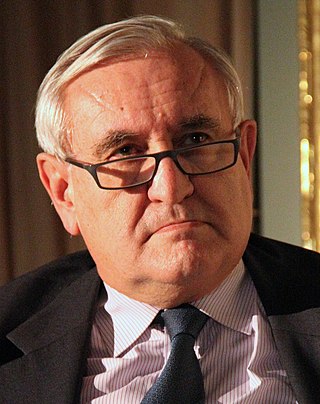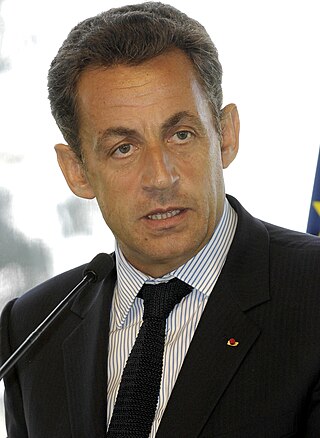
Jean-Pierre Raffarin is a French politician who served as Prime Minister of France from 6 May 2002 to 31 May 2005.

The Rally for the Republic, was a Gaullist and conservative political party in France. Originating from the Union of Democrats for the Republic (UDR), it was founded by Jacques Chirac in 1976 and presented itself as the heir of Gaullist politics. On 21 September 2002, the RPR was merged into the Union for the Presidential Majority, later renamed the Union for a Popular Movement (UMP).

The Union for a Popular Movement was a centre-right political party in France belonging to the Gaullist tradition. During its existence, the UMP was one of the two major parties in French politics along with the Socialist Party (PS). The UMP was formed in 2002 as a merger of several centre-right parties under the leadership of President Jacques Chirac. In May 2015, the party was succeeded by The Republicans.

The Union for French Democracy was a centre-right political party in France. The UDF was founded in 1978 as an electoral alliance to support President Valéry Giscard d'Estaing in order to counterbalance the Gaullist preponderance over the political right in France. This name was chosen due to the title of Giscard d'Estaing's 1976 book, Démocratie française.

The Radical Party, officially the Republican, Radical and Radical-Socialist Party, is a liberal and social-liberal political party in France. Since 1971, to prevent confusion with the Radical Party of the Left (PRG), it has also been referred to as Parti radical valoisien, after its headquarters on the rue de Valois. The party's name has been variously abbreviated to PRRRS, Rad, PR and PRV. Founded in 1901, the PR is the oldest active political party in France.
In France, the term Gaullist Party is usually used to refer to the largest party professing to be Gaullist. Gaullism claims to transcend the left–right divide in a similar way to populist republican parties elsewhere such as Fianna Fáil in Republic of Ireland, the Justicialist Party in Argentina, and the African National Congress in South Africa.

Nicolas Paul Stéphane Sarközy de Nagy-Bocsa is a French politician who served as the President of France from 2007 to 2012.
The Movement for France was a conservative Eurosceptic French political party, founded on 20 November 1994, with a marked regional stronghold in the Vendée. It was led by Philippe de Villiers, once communications minister under Jacques Chirac.

Legislative elections were held in France on 10 June and 17 June 2007 to elect the 13th National Assembly of the Fifth Republic, a few weeks after the presidential election run-off on 6 May. 7,639 candidates stood for 577 seats, including France's overseas possessions. Early first-round results projected a large majority for President Nicolas Sarkozy's Union for a Popular Movement (UMP) and its allies; however, second-round results showed a closer race and a stronger left. Nevertheless, the right retained its majority from 2002 despite losing some 40 seats to the Socialists.

Presidential elections were held in France on 21 and 22 April 2007 to elect the successor to Jacques Chirac as president of France for a five-year term. As no candidate received a majority of the vote, a second round was held on 5 and 6 May 2007 between the two leading candidates, Nicolas Sarkozy and Ségolène Royal. Sarkozy was elected with 53% of the vote.

Éric Besson is a French politician and businessman. From 2009 to 2010, he was the Minister of Immigration, Integration, National Identity and Co-Development in the government of François Fillon.
The Centrists, known as The Centrists - New Centre since 2018, formerly known as New Centre and European Social Liberal Party, is a centre-right political party in France formed by the members of the Union for French Democracy (UDF) – including 18 of the 29 members of the UDF in the National Assembly) – who did not agree with François Bayrou's decision to found the Democratic Movement (MoDem) and wanted to support the newly elected president Nicolas Sarkozy, continuing the UDF–Union for a Popular Movement (UMP) alliance.

The presidency of Nicolas Sarkozy began on 16 May 2007 when Nicolas Sarkozy became the sixth President of the French Fifth Republic, following his victory in the 2007 presidential election. A candidate of the conservative Union for a Popular Movement (UMP), he nominated François Fillon as Prime minister, who formed a composite government, a bit modified following the UMP's relative victory during the June legislative election. Although the UMP had not obtained a majority as large as expected, Nicolas Sarkozy could launch the reforms he had pledged as a candidate as soon as he was elected. However, he tried to open his government to the opposition party, appointing several politicians close to the opposition parties.

The Modern Left, is a centrist political party in France founded in 2007.
The Liaison Committee for the Presidential Majority was a structure initiated by Nicolas Sarkozy to coordinate the political parties that support his action.

Regional elections were held in France on 14 and 21 March 2010. At stake were the presidencies of each of France's 26 régions, which, though they do not have legislative autonomy, manage sizable budgets.

A Senate election was held for 165 of the 348 seats in the Senate of France on 25 September 2011. Senate members were primarily elected by municipal officials, and the number of senators was increased from 343 to 348, due to the growth of France's population since the previous election was held in 2008. The Socialist Party and other left-of-center parties gained a majority of seats in the upper house for the first time in the Fifth Republic.
Sarkozysm (Sarkozysme) is the name commonly given to the policies and political agenda of former French President Nicolas Sarkozy, including his presidential policies between 2007 and 2012. It can also refer to the supporters of Nicolas Sarkozy within the centre-right Les Republicains (LR).

The Socialist Party is a French centre-left and social-democratic political party. It holds pro-European views. The PS was for decades the largest party of the "French Left" and used to be one of the two major political parties in the French Fifth Republic, along with The Republicans. It replaced the earlier French Section of the Workers' International in 1969 and is currently led by First Secretary Olivier Faure. The PS is a member of the Party of European Socialists, Progressive Alliance and Socialist International.

The Republicans is a liberal-conservative political party in France, largely inspired by the Gaullist tradition. The party was formed on 30 May 2015 as the re-incorporation of the Union for a Popular Movement (UMP), which had been established in 2002 under the leadership of then President of France Jacques Chirac.